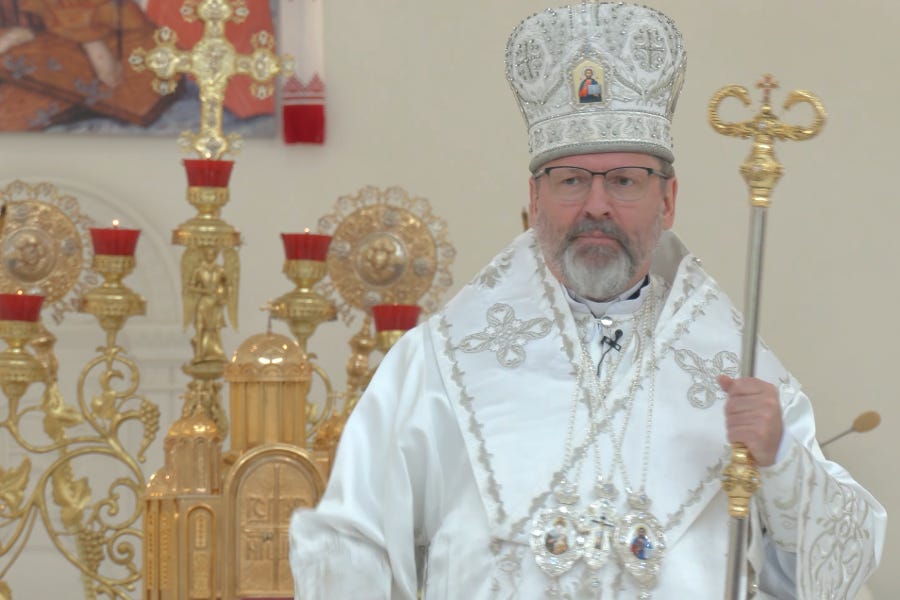When Fr. Gabriel Romanelli traveled to Bethlehem to buy medicine for a nun in early October, he expected to return soon to his parish in Gaza City.
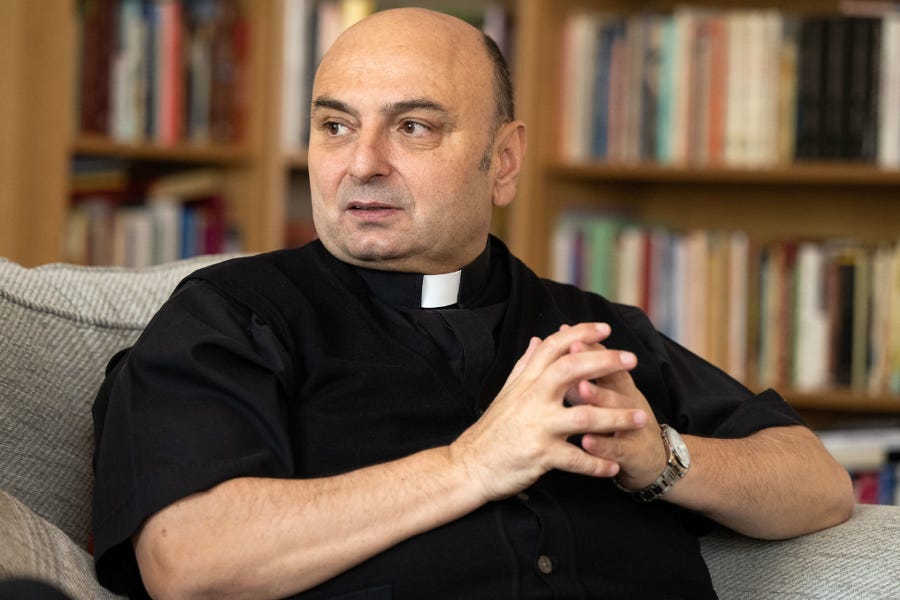
But the Oct. 7 attack on Israel — in which Hamas fighters killed more than 1,000 people, including around 700 civilians — cut the Argentine priest off from his flock at the Holy Family Church, the only Catholic church in Gaza.
In an April 25 interview with The Pillar, Fr. Romanelli said that after Oct. 7, his parish turned from an “oasis” into a refugee camp.
An estimated 700 people sought refuge in the parish compound as Israel responded with a ground invasion of Gaza. They included the majority of Gaza’s Latin Catholic community, said to number around 140 people, and many Orthodox Christians.
Fr. Romanelli — an energetic figure in his early fifties, with black-framed glasses that magnify his eyes — was born in Buenos Aires and entered the Institute of the Incarnate Word (IVE), an Argentine religious institute with links to the Holy Land.
The priest, who is fluent in Arabic among several other languages, has spent almost 30 years of his life in the Middle East. He began serving as the Holy Family’s pastor in 2019. He spoke with The Pillar via Zoom during a week-long U.K. visit.
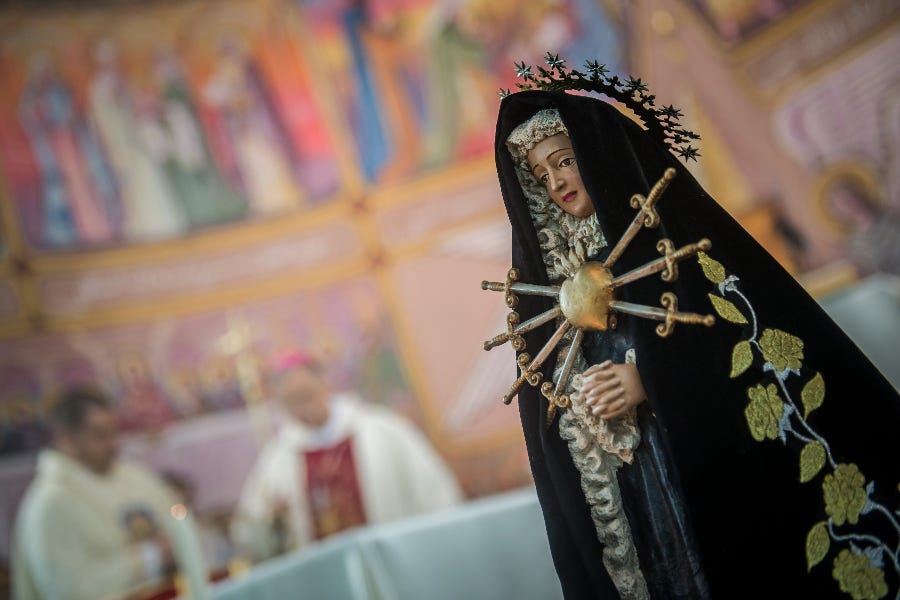
This interview has been edited for length and clarity.
What is the situation like today for the people who are living in the Holy Family compound?
The situation is very tough, because after six months of this war, the people lost many members of the community — 33 members, the majority killed by the IDF operation, according to the information of the Latin Patriarchate and the Greek Patriarchate of Jerusalem.
So, more than 3% of our community died, for many different reasons. At least 250 people have also emigrated. As well as the continued bombing and the loss of a great number of the community, they lost their houses, their relatives’ houses, schools, restaurants, places of work, etc.
Because no one knows until when this terrible war will continue, the people are depressed. They are without hope — not without hope in the Lord, because they are very faithful people, very strong in the faith — but the ordinary hope, the ordinary life, is very, very hard.
So for this reason, many of them desire to stop the war, of course. Many of them start thinking of going out, if they can get permission to go out, because the majority of the population in Gaza, they cannot go out.
Could you describe a typical day in the life of someone living in the compound?
In the compound, we tried for many, many years to create a real oasis, for Christians and Muslims also. In the morning, there were activities for the school, for Christians and Muslims. And in the afternoon and evening, there were the Christian activities.
After the war began, the oasis changed into a shelter, a refugee camp. We received 700 Christians, Catholic and Orthodox — so the majority of the Christian community. There were also 54 children with the sisters of Mother Teresa — Muslims with disabilities. At this moment, we have around 500 people there.
They start in the morning with prayer, the holy rosary, in front of the Holy Sacrament in the church. The old people sleep there inside.
And after that, Fr. Youssef [Asaad], my vicar there, celebrates the Holy Sacrifice. And after, they try to make breakfast. That means a cup of tea with some bread. After many months, in the last weeks, we make bread every day in the compound.
And after that, the day starts. A different group continues to pray the holy rosary. Some of the guys go to the sisters of the Mother Teresa houses, to help the sisters in the care of the disabled.
From the beginning of the war, we made different committees, so there are people responsible for the bathroom, the water, the food, the order, the children... They start to work until one or two, when they take something to eat and rest.
Unfortunately, we’re cooking for all of the refugees, in the best of cases, three times a week. We distribute with the refugees, and also we give food outside the compound to the Muslim civilian people in our neighborhood.
After, they take a nap. This is a common thing between South America — I am from Argentina — and the Middle East. So even in the war, they try to take a nap, a siesta.
And after that, some young people continue to play, to speak. We started two months ago to give some lessons, because all the schools are closed, and other activities for children in the oratory.
After the holy rosary in the evening, we complete the activities. Sometimes some groups continue to speak. One group keeps up all night to help with any needs, because it’s 500 people, a very small town.
That’s the daily schedule there.
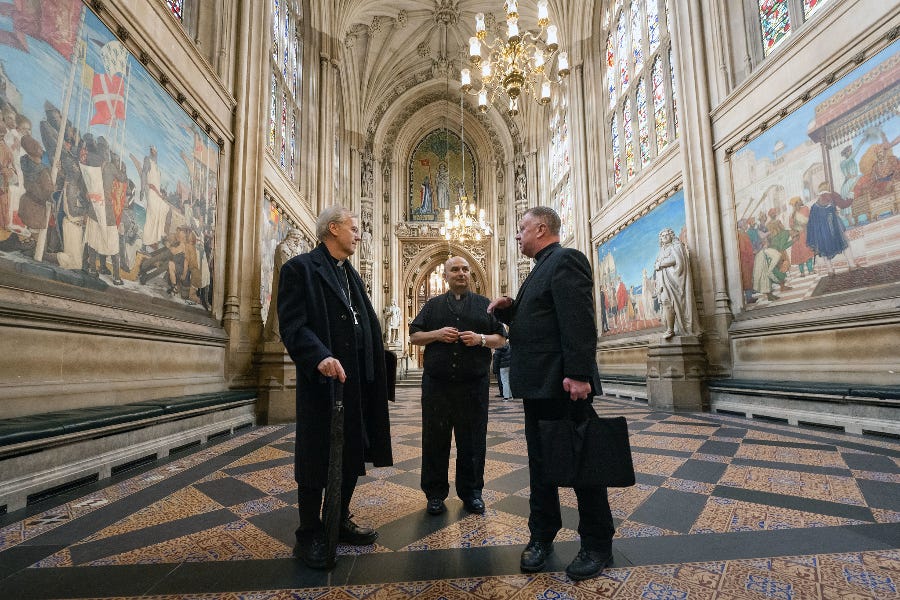
What is their greatest need at the moment?
It’s peace, a ceasefire. Without a ceasefire, the people continue to die.
The ceasefire is not the solution, but it’s the first step, the start of the solution. It’s necessary especially in the north, where in Gaza City there are now between 400,000 people to 500,000 people. They need everything: water, food, medicine. Unfortunately, the authorities don’t allow a huge amount of humanitarian help to enter, and this is a real need.
Before the war, 500 trucks entered Gaza a day, and it was not enough. Now sometimes, in the south, there enter only 30, 40, 80 trucks. It’s not enough at all.
But in the north, almost nothing. Sometimes three trucks. It’s nothing, even though this helps some people. The United Kingdom, Jordan, and other countries help in this initiative. But there are half a million people in Gaza City, in the north, so more assistance is necessary.
You’ve been away from your parish since Oct. 7, 2023. When you do finally return, what are the things you most want to do?
This is a terrible thing, because I understand that my parish changed. But even if I understand, the idea is different from the reality.
We said that 3% of our community were killed or died, especially for the lack of medicines. We said that now 25% of our community left. It means that I will find another parish, with a lot of destruction.
So we ask the Lord to give me his grace, his power, to do what we can do. I am not a hero. We’re normal people. But I must be there. I want to be there, because this is my mission. If I am sure that Jesus the Lord asked me to go to another place, I am ready. But until now it is clear that here is his will.
Even if it is his will, many times it is very hard. And I think this is one of the hardest experiences that I will have when one day I come back there.
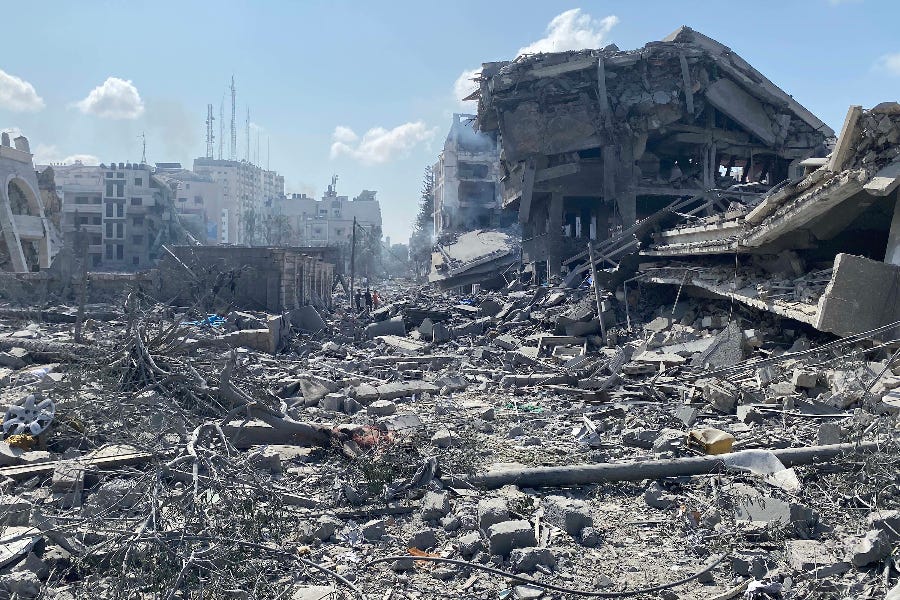
What is the best way for Catholics in the West to help you and your parishioners now?
There are three ways to help. The first is prayer.
Unfortunately for us Christians — Catholics particularly — many times we have said: “We cannot do anything, only prayer.” But it’s the opposite: our power is prayer. Jesus asked us many times to pray, because to pray is to ask, to enter into dialogue and into the force of God, the ruler of history. So it’s necessary to pray, to offer the Holy Sacrifice, the rosary, etc.
The second is to speak about the situation. It’s not easy to be balanced, in the good sense of that term. This is not a match, with teams: “I am pro”; “I am against.” It’s necessary to find the right expressions, to distinguish.
Unfortunately after Oct. 7 — but also before — many words are used in a bad way. So it’s necessary to find good expressions and use them in a good way, with a good feeling, with wisdom, with charity, with prudence.
And sometimes if it is necessary to be silent, sometimes it’s necessary also to speak, to explain: war is not the only solution. War is never the only solution. Today, tomorrow, one day, the diplomatic solution, the social solution, the humanitarian solution is the way, because answering violence with violence was never the total, definitive solution.
So it is necessary to understand and spread good ideas in good ways.
The third way is material help. I believe the best way to help at this time is through the Latin Patriarchate of Jerusalem, our diocese. The Latin Patriarch of Jerusalem, Cardinal Pierbattista Pizzaballa, made some months ago an appeal for all people. It’s still running, because there is a lack of anything there. It is necessary to help, with food, with money. This appeal, at least at this moment, is the best way that I know to help.

The killing of Naheda and Samr Anton at the parish on Dec. 16, 2023, was reported worldwide. Has any new information emerged about their deaths?
You can read the information provided by the Latin Patriarchate of Jerusalem on Dec. 16.
There’s no other information, unfortunately. They were killed inside our compound by an IDF sniper. The same day, at least seven more were wounded inside the compound.
What’s been the hardest part about not being in your parish?
The hardest part was the days before Christmas, because all these days the neighborhood was under military attacks. So many people were wounded inside our compound. The worst day was the day that Samr and Naheda were killed.
And also the worst day is these days, because since early on I feel that no one wants to stop that. Even if some voices start to speak as the Holy Father asked, “Enough. Stop. Ceasefire” — in spite of the liberation of the hostages, of course, and the possibility to cure the wounded people, of course — “But stop, ceasefire.”
Even if some people start to speak in this way, the leaders of many countries have surrounded themselves with the logic of war. And this is an illogical thing, not a good thing. Not for Israel, not for Palestine.
So I desire a miracle, because a change in people’s will is a moral miracle. It’s necessary to pray to the Lord and continue to work, to arrive at least at a ceasefire.



